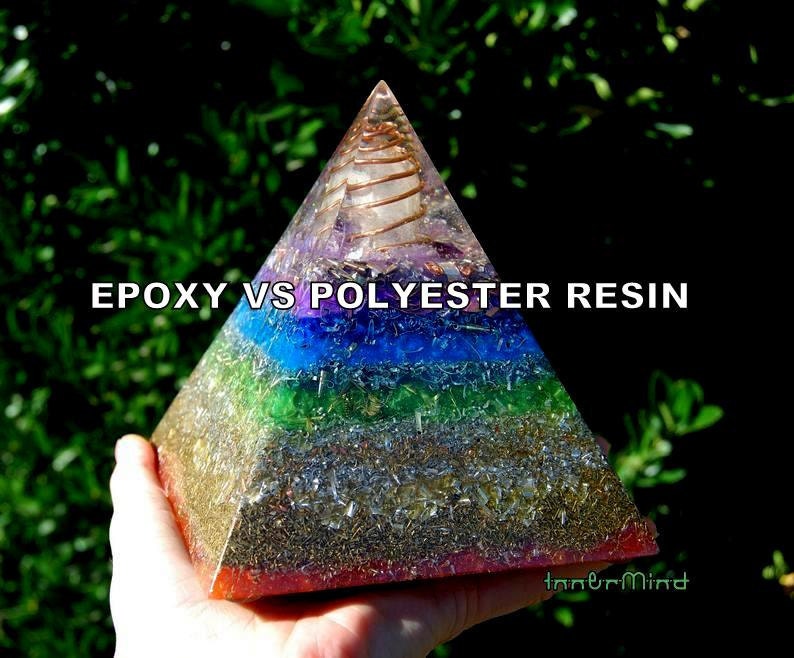Understanding the Difference Between Epoxy and Polyester Resin: Why Polyester Resin is My Top Choice for Orgonites
Crafting orgonites is a passion that combines art, spirituality, and science. One of the key decisions in making high-quality orgonites is choosing the right resin. In this blog post, I will delve into the differences between epoxy and polyester resin and explain why I prefer polyester resin for my orgonite creations.
While epoxy resins emit fewer immediate fumes, their chemical composition and handling risks often make them more harmful than polyester resins while they are still in the process of curing. However, once fully cured, both resins generally pose minimal health hazards. Proper safety measures are crucial when working with either resin to ensure a safe crafting environment.
Key Differences Between Epoxy and Polyester Resin
- Curing Time:
- Epoxy Resin: Takes longer to cure, often requiring several hours to days to fully harden.
- Polyester Resin: Cures much faster, typically within 15-30 minutes, which can be advantageous for quick projects.
- Durability:
- Epoxy Resin: Extremely durable and resistant to environmental damage, making it ideal for high-stress applications.
- Polyester Resin: Less durable than epoxy, but still provides sufficient strength for many applications, including orgonites.
- Clarity and UV Resistance:
- Epoxy Resin: Maintains clarity over time and offers better UV resistance, which prevents yellowing.
- Polyester Resin: Can yellow over time when exposed to UV light, though some formulations include UV inhibitors to mitigate this effect.
- Cost:
- Epoxy Resin: More expensive due to its superior properties.
- Polyester Resin: More affordable, making it a popular choice for large projects and hobbyists.
- Workability:
- Epoxy Resin: Low odor and easy to work with, but requires precise mixing to achieve the best results.
- Polyester Resin: Has a stronger odor and can be more challenging to work with due to its fast curing time, but it is easier to sand and polish once cured.
- Environmental and Health Impact:
- Epoxy Resin: Contains more hazardous chemicals and often requires more stringent safety measures during use.
- Polyester Resin: Generally considered to be less harmful to both people and the environment due to lower toxicity levels. Although it emits noticeable styrene vapors while curing, proper ventilation can minimize exposure. While cured this resin is non toxic.
What Resin is Better in Orgonite?
Orgonite is a blend of resin, metal shavings, and crystals which balances and harmonizes energy. When making orgonite, the choice of resin—polyester or epoxy—affects the final product. Polyester Resin is often considered better than epoxy resin for orgonite due to several factors:
- Shrinkage: Polyester resin shrinks more than epoxy resin as it cures, which compresses the metal shavings and crystals tightly together. This tighter compression is believed to enhance the orgonite’s energy-balancing properties by creating more mechanical pressure on the embedded elements.
- Clarity and Aesthetics: Polyester resin dries clear and maintains clarity over time, enhancing the visual appeal of orgonites. It can also be polished easily to a high gloss, further enhancing the aesthetic quality of the orgonite.
- Better for environment: Polyester resin is generally considered more environmentally friendly compared to epoxy resin. It typically emits fewer harmful chemicals during the curing process and it is non toxic when fully cured resulting in lower environmental impact. Additionally, polyester resin often requires less energy to produce and is derived from renewable resources, further contributing to its eco-friendliness. Moreover, polyester resin can be recycled and reused in certain applications, reducing waste and conserving resources. Overall, polyester resin offers a more sustainable option for crafting projects, promoting environmental responsibility in the manufacturing and use of resin-based products.
In conclusion, polyester resin emerges as my preferred choice for crafting orgonites due to its affordability, ease of use, versatility, aesthetic appeal, and eco-friendliness. Its minimal health hazards, lower environmental impact, and sustainability align perfectly with my crafting ethos and objectives. By choosing polyester resin, I not only create one-of-a-kind orgonites but also contribute to a safer and more environmentally mindful crafting practice.

